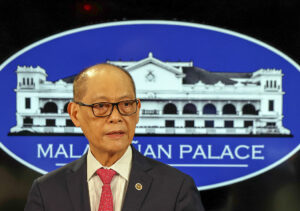New progressive taxes, belt tightening may help gov’t address ballooning debt

By Diego Gabriel C. Robles
THE GOVERNMENT should consider more progressive taxes and belt-tightening measures amid ballooning debt, economists said.
“We would definitely have to raise taxes because of the huge expenditures. However, this should be made progressive. Furthermore, we should assure the public that the taxes will be used for the public good,” said Leonardo A. Lanzona, director of the Ateneo Center for Economic Research and Development.
The National Government’s outstanding debt hit a record-high P12.79 trillion at the end of June, up 2.4% from the previous month, the Bureau of the Treasury (BTr) said on Friday.
Rizal Commercial Banking Corp. Chief Economist Michael L. Ricafort attributed the higher debt to increased government borrowings after the elections in May, and the peso’s 5% depreciation against the US dollar.
Domestic debt inched up 1.2% month on month to P8.77 trillion as of end-June.
External debt jumped 5.1% to P4.02 trillion due to “the impact of local currency depreciation against the USD amounting to P186.94 billion and the net availment of external financing amounting to P43.18 billion; offsetting the P35.72 billion effect of net depreciation against the US dollar on third-currency denominated obligations.”
“The economy is in a precarious situation — inflation untamed until 2024, debt exploding, and no assurance of revenue increase amidst the crisis,” University of the Philippines Professor Emeritus Rene E. Ofreneo said in an e-mail.
The country’s debt level reached 63.5% of gross domestic product (GDP) at the end of the first quarter, exceeding the 60% threshold prescribed by multilateral lenders for developing markets. The debt-to-GDP ratio surged from 39.6% as of end-2019 after the government ramped up its borrowings for infrastructure projects and pandemic response.
NEW TAXES“There is a need to intensify tax collections based on existing tax laws, new taxes, higher tax rates, and other tax reform measures, as well as other fiscal reform measures such as disciplined spending, rightsizing the government, preventing leakages in government spending, as well as anti-corruption measures,” Mr. Ricafort said in an e-mail.
The government targets revenue to increase annually from 15.2% of GDP in 2022 all the way to 17.6% by 2028. It also aims to reduce the budget deficit from 7.6% of GDP in 2022 to just 3% in 2028.
President Ferdinand R. Marcos, Jr. in his State of the Nation Address urged Congress to approve a tax on digital service providers, which is estimated to generate P11.7 billion in revenues in 2023.
The Finance department has also pushed for a tax on single-use plastics, which may generate P1 billion in annual revenues.
The Treasury has estimated that the government needs to raise P249 billion annually in incremental revenue to avoid new borrowing and reduce the debt load.
“New taxes and higher tax rates need to be fair, equitable, and progressive, especially targeted to those that can afford them or those from the higher income brackets or at least prevent adding burden to the poor, most vulnerable sectors, and those hit hard by the pandemic,” Mr. Ricafort said.
For Mr. Lanzona, the government should pursue taxes on the wealthy, with the poor shouldering less of the tax burden.
“The best way is to tax income directly in order not to distort their investment decisions. But unfortunately, this can prove difficult and can cause them not to reveal their true incomes. Taxes on consumption may cause them to divert their investments but are easier to impose,” he said in an e-mail.
Mr. Ofreneo suggested several forms of wealth taxation, including a tax on windfall profits, a one-off emergency tax, or the institutionalization of a progressive taxation schedule.
“With his huge political capital of 31 million votes, President Ferdinand ‘Bongbong’ R. Marcos, Jr. is in a good position to ask the wealthy class to express solidarity to the people and the nation by agreeing to wealth taxation,” he said in an e-mail.
However, proposals on wealth taxes have already received a lukewarm reception from Finance Secretary Benjamin E. Diokno, who said this may scare investors.
University of Asia and the Pacific Economist Bernardo M. Villegas said that the government’s focus should be on cost reduction and savings, as well as digitalization of government processes.
“I have great hopes for improvements in tax collections through a more aggressive digitalization of the BIR (Bureau of Internal Revenue) operations being advocated by the present BIR Commissioner, who is an expert in digitalization,” Mr. Villegas said in an e-mail.
Asian Institute of Management Economist John Paolo R. Rivera said that the government should go beyond imposing new taxes, and pursue efforts to plug leakages in tax collection, rightsize the bureaucracy, and belt-tightening by cutting waste on unnecessary expenditures.
“These may be unpopular moves but can be subject for review and debate to weigh cost and benefit,” he said in a Viber message.
Budget Secretary Amenah F. Pangandaman earlier said the department is finalizing a proposed measure to rightsize the bureaucracy, which will be submitted to Congress.




